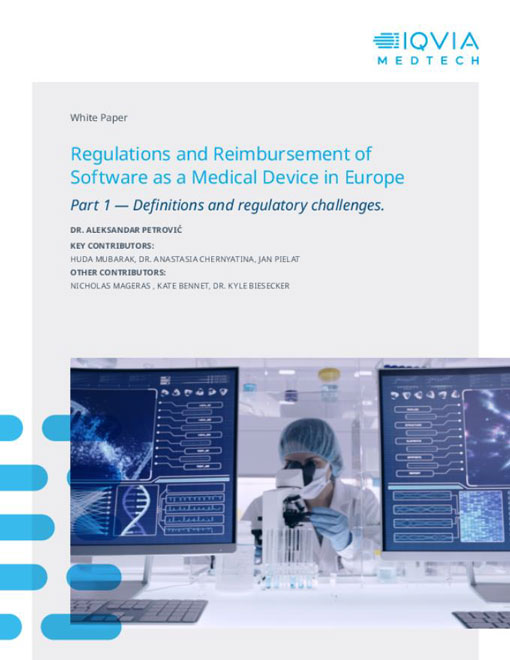Regulations and Reimbursement of Software as a Medical Device in Europe- Part1

With the advancement of technologies leading to a shift in how healthcare is administered and delivered, software has become an essential component of the development of medical devices. Particularly “Stand alone” software or “Software as a Medical Device (SaMD)” has seen fast growth recently as there is no hardware involved, fewer constraints as well as the use of fast feedback loops for improvement. Part 1 of this publication series from IQVIA – an associate member of AdvaMed® – explores SaMD definition, its challenges and the ways the regulatory bodies try to address them, as well as the expected development of regulations related to Artificial Intelligence (AI) and Machine Learning (ML) in SaMD.
Related Reading
News / Diagnostics / Digital Health
Satio, Nanowear announce partnership offering first, holistic, home-based in vivo- + in vitro diagnostics + drug delivery
April 15, 2025
BOSTON and NEW YORK, April 14, 2025 /PRNewswire/ — Satio and Nanowear have agreed to partner to advance patient-friendly, home-based diagnostic, and therapeutic care. This collaboration integrates Nanowear’s at-home AI-based nanotechnology biomarker diagnostic platform with Satio’s at-home blood draw diagnostics and drug delivery systems/patches: combining time synchronous, in vivo and in vitro diagnostics for precision therapeutics and individualized AI-based risk assessment.
Resource / Executive Orders / Government & Legislative Affairs / Tariffs
AdvaMed® Advancements: Q1 2025 Report
April 15, 2025
AdvaMed’s Q1 2025 report focuses on tariffs, policy action, and how we’re protecting Medtech innovation.
News / Coverage & Payment / Diagnostics / Digital Health / Government & Legislative Affairs
Bipartisan Health Tech Investment Act Will Enhance Patient Access to AI-Enabled Medical Devices
April 10, 2025
WASHINGTON – AdvaMed, the Medtech Association, today commended Senators Mike Rounds (R-SD) and Martin Heinrich (D-NM) for introducing the Health Tech Investment Act (S. 1399). This landmark bipartisan legislation will establish a stable reimbursement pathway for medical devices authorized by the U.S. Food & Drug Administration (FDA) that rely on artificial intelligence (AI) and machine learning (ML), also known as Algorithm-Based Healthcare Services (ABHS).
News / Executive Orders / Government & Legislative Affairs / Tariffs
AdvaMed Statement on President’s Reciprocal Tariff Pause
April 9, 2025
WASHINGTON – Today AdvaMed, the Medtech Association, released the following statement from President and CEO Scott Whitaker:
Resource / Coverage & Payment / Executive Orders / Global & Trade / Supply Chain / Tariffs
Amendment To Reciprocal Tariffs and Updated Duties as Applied to Low-Value Imports from The People’s Republic of China
April 9, 2025
Details a sweeping tariff hike to 84% on Chinese imports and de minimis increases, aiming to protect U.S. economic and national security.
Event / Compliance / Global & Trade / Legal
U.S. National Security & Business: Navigating Sanctions, Export Controls, CFIUS, and Outbound Investment Under the Trump Administration
June 25, 2025
1:00 PM – 2:00 PM
Akin will provide a CLE program covering the latest legal issues for inbound trade and investment, including the Trump Administration’s approach to trade policy and tariff issues, and strategies medical technology companies can employ to assess and mitigate legal risk. Attendees are eligible to receive 1.0 CLE.
Event / Digital Health / research & policy papers
Provider Trends & Implications on MedTech Companies Webinar
May 8, 2025 11:00 AM – 12:00 PM ET
Each year, L.E.K. surveys approximately 200 senior hospital executives and administrators to uncover key strategic priorities, trends, challenges, and opportunities in the healthcare industry. Join the L.E.K. Medtech team as we share these valuable insights and discuss what this means for MedTech companies.
Event / Digital Health / research & policy papers
The Benefits, Risks and Future of ePTFE
May 14, 2025
12:00 PM – 1:00 PM
The use of ePTFE in medical devices has enormous advantages, but getting it right requires deep expertise. Join us as we explore the benefits, risks, and mitigation strategies, along with innovative processing approaches that unlock its full potential.